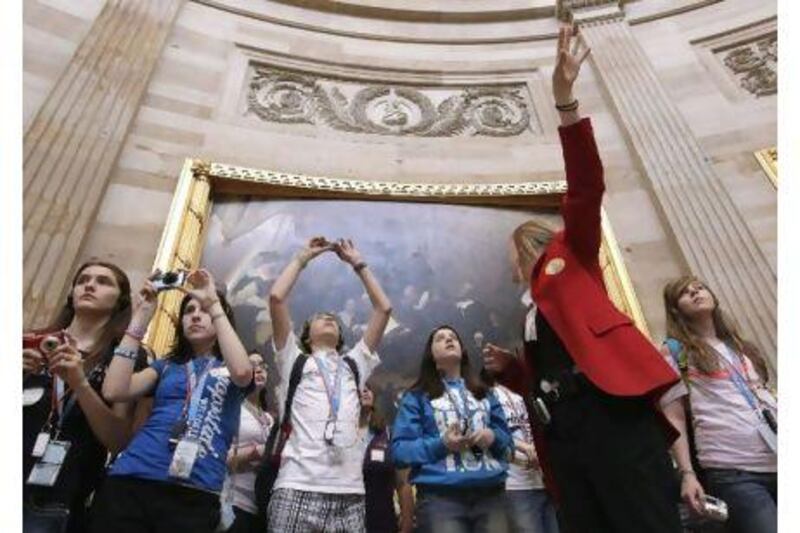WASHINGTON // The US president, Barack Obama, has failed to break a budget impasse with Republicans during late-night talks, although he said the two sides were creeping towards a deal to avert a government shutdown.
Mr Obama met the Republican House of Representatives speaker, John Boehner, and the Democratic Senate leader, Harry Reid, on Wednesday, seeking to defuse a hugely significant showdown before today's midnight deadline, US time, for federal funding to run dry.
If no deal is reached, vast parts of the US government will shut up shop, forcing combat troops to go without paycheques and national parks to close in a shutdown that could also damage the fragile economic recovery.
Overseas, the overwhelming majority of US diplomats are considered essential personnel and are expected to remain at their posts, according to officials familiar with the plans. Exceptions include lower-ranking administrative embassy staff members, many of whom are not American. Many US Agency for International Development operations are expected to continue as normal, because the agency relies on many contractors.
The halt of the government, the chief industry of Washington, would also affect tourists, the Mall and its museums, hundreds of thousands of federal workers and government contractors across the country, and thousands of district of Columbia residents who would lose city services.
Nationwide, about 800,000 federal employees could be temporarily laid off, some deprived of their BlackBerrys and other devices, according to senior Obama administration officials familiar with the plans.
National parks and Smithsonian museums would close. Ford's Theatre, a national historic site, would be closed to the public and its programming cancelled. The Washington Monument also would be closed.
Federal agencies began to release their plans for a potential shutdown.
Many government websites would stop updating information and many White House staff members would be sent home. Taxpayers submitting income tax returns through the mail would not immediately receive refunds and federal small-business loans would stop. But current Medicare, Medicaid and Social Security beneficiaries would continue to receive payments.
Congressional negotiators pushed last-ditch efforts to agree on a 2011 budget and prevent a shutdown, which will begin on Saturday if no budget agreement is reached.
A key question for hundreds of thousands of Washington-area federal workers is whether they would have to work through an impasse without pay. Departments began answering such questions on Wednesday.
In an e-mail, the health and human services secretary, Kathleen Sebelius, said she and Mr Obama "are very much aware that a shutdown would impose hardships on many employees as well as the groups and individuals our department serves".
But "prudent management requires that I plan for an orderly shutdown should Congress fail to pass a funding bill".
In messages sent to all employees, administration officials promised to inform people of their fates no later than today. But employees would be expected to report to work on Monday to assist with any shutdown-related tasks, senior administration officials said.
When they arrive on Monday, workers with government-issued BlackBerrys and other devices would have to surrender them to agency bosses.
In the federal courts, trials would continue and litigations could be filed, said David Sellers, the spokesman for the administrative office of the US courts.
If a shutdown lasts longer than two weeks, payments will be delayed for jurors and for lawyers appointed to represent indigent defendants. "You won't have any contracts moving ahead, new equipment, advances in technology," Mr Sellers said. "The behind-the-scenes things that support the courts."
* Washington Post with additional reporting by Agence France-Presse






